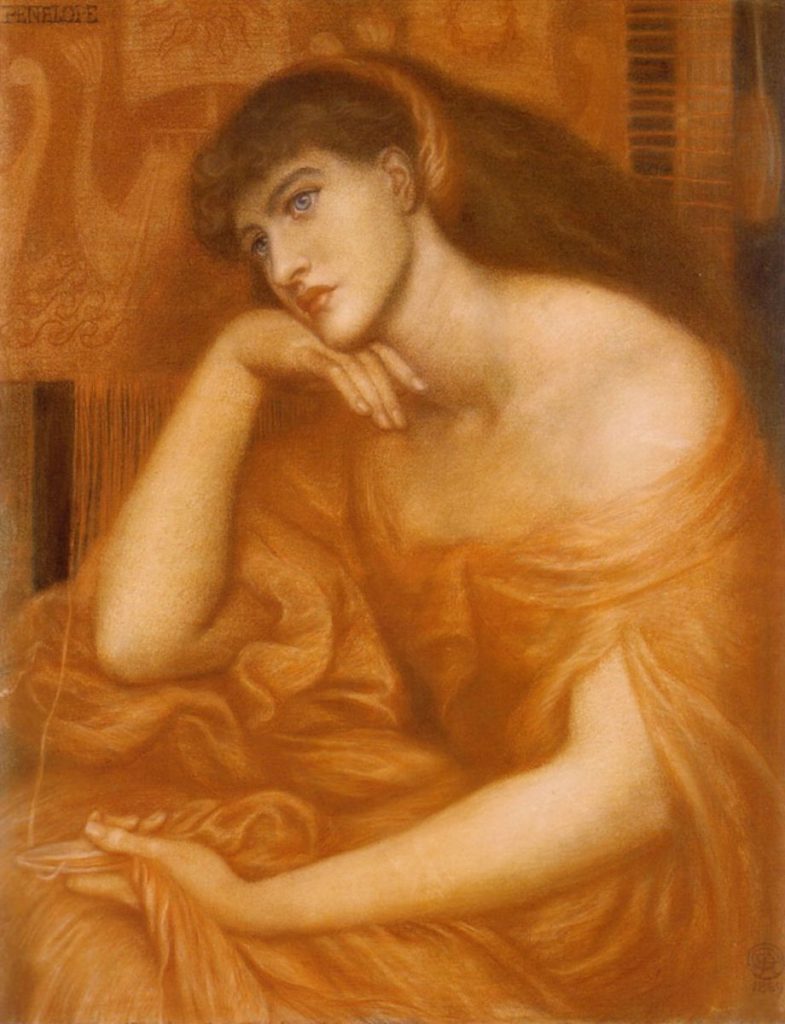
Wednesday
In an inspiring essay entitled “Though She Be But Little, She Is Fierce” (Helena’s description of Hermia in Midsummer Night’s Dream), my student Gracie LaRue convincingly argues that The Odyssey’s Penelope is severely underrated. Gracie’s insight comes out of a long overdue appreciation of her own mother.
The details are too private to share here, but suffice it to say that, as teenagers, Gracie and her brother failed to realize that their mother was holding the family together in the face of intolerable stresses. Like 8th century Greek society in general and Telemachus in particular, they couldn’t acknowledge how much their mother was doing.
In Margaret Atwood’s Penelopiad, Penelope looks back at her life and complains that she has become the legend of the model wife, used as a stick by insecure husbands to keep their spouses in line. Gracie notes the numerous times in The Odyssey when wives are criticized. The dead Agamemnon is understandably the primary complainant, saying of Clytemnestra,
…She has such an evil mind
that she has poured down shame on her own head
and on all other women, even good ones.
(trans. Emily Wilson)
And:
So you must never treat your wife too well.
Do not let her know everything you know.
Tell her some things, hide others.
There’s also Eumaeus the swineherd, who tells the disguised Odysseus, “Sex sways all women’s minds,/ even the best of them.”
Gracie understandably focuses on Telemachus, who can’t figure his mother out. Menelaus doesn’t help matters when he points out the uncertainty of his position:
…You know how women are—
they want to help the house of any man
they marry. When one darling husband dies,
his wife forgets him, and her children by him.
She does not even ask how they are doing.
Would Telemachus be denied his inheritance in such an instance? It could happen. For that matter, his stepfather could murder him (if the suitors as a group don’t do so first). With the absence of Odysseus, Ithaca is experiencing a power vacuum, and the suitors’ competition may be the only thing preventing an unscrupulous man from stepping in and grabbing both Penelope and her wealth. After all, as Telemachus learns from the town counsel, no one in Ithaca is willing or able to stand up for him.
Penelope therefore, as Gracie notes, follows the best course of action given her limited options: she plays an intricate waiting game. Her goal is to keep things in suspension until a solution materializes.
First she employs a delaying tactic, saying that can’t marry until she completes her father-in-law’s shroud, even as she undoes her work each evening. When that is discovered, she tries shaming the suitors for their plot to kill Telemachus. As they are impervious to shame, she next sets up a challenge that she knows they won’t be able to meet: stringing Odysseus’s bow and shooting it through twelve axe heads. It doesn’t gain her a lot of time but it’s something.
A couple of times, the epic mentions that Penelope is pleased when Telemachus orders her around. In the context of the waiting drama, Telemachus stepping into Odysseus’s shoes is another hope. Indeed, the suitors are beginning to see Telemachus as a potential threat.
Reading Gracie’s essay gave me insight into one puzzling passage. At one point, Athena tells Penelope to make herself beautiful and show herself off to the suitors. Since Odysseus is in the hall at that point, some have speculated that, whether consciously or unconsciously, his wife is welcoming him home. However, reminding the suitors of her beauty can also be seen as her using what leverage she has to keep them competing. As long as they do, there’s no moment of crisis.
After Odysseus reveals himself and kills the suitors, Telemachus once again underestimates his mother, castigating her as Gracie recalls castigating her own mother:
Mother! Cruel, heartless Mother!
Why are you doing this, rejecting Father?
Why do you not go over, sit beside him,
and talk to him? No woman in the world
would be so obstinate! To keep your distance
from him when he has come back after twenty
long years of suffering! Your heart is always
harder than rock!
Odysseus, by contrast, is far more impressed by what his wife has pulled off:
Hardened Odysseus began to smile.
He told the boy,
“You must allow your mother
to test me out; she will soon know me better.”
Penelope once again proves up to the task, essentially getting Odysseus to declare the solidity of their marriage. (Only the two of them know that their bed is constructed out of a rooted tree.) Having won the war, she now needs to win the peace.
For privacy’s sake, I leave the “it” in Gracie’s conclusion vague, but you can imagine various life crises that might cause a parent to act heroically. It is as a Penelope-type hero that Gracie regards her mother:
With the gift of hindsight, I know it wasn’t her fault…What’s amazing is that in all those times my brother and I abused her with our insults, screaming at her that first night in the rental house where the three of us were back to sharing bathrooms, she could’ve told us everything, stripping the blame from herself…but she didn’t. She remained…so selfless that sometimes, looking back, I still can’t figure out her reasoning behind it; but I do know one thing, and that is that my mother is not selfish nor ever has been. In those final years of living together as a family, she was the hero…, just as Penelope is Telemachus’ hero for those twenty years, whether he realizes it or not.
Mothers, when you send your kids off to college, encourage them to take humanities courses. The rewards can be immense.